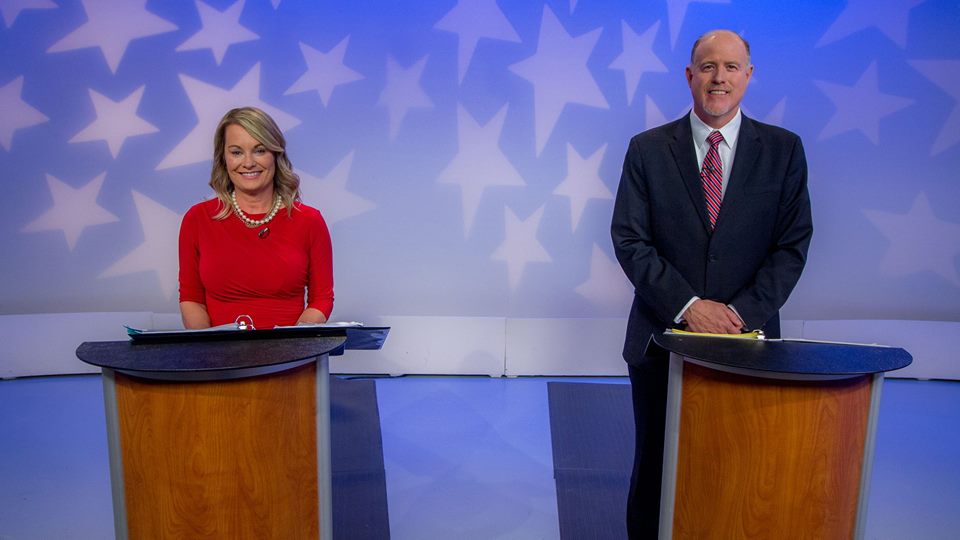Finally on the same stage with incumbent state superintendent Sherri Ybarra, challenger Jeff Dillon decried a lack of leadership and vision from Ybarra’s shop.

Ybarra defended her record, dismissed some allegations as gossip and myth, and worked in jabs at Dillon’s work as Wilder school superintendent.
Six takeaways from Friday night’s Republican debate on Idaho Public Television:
About Idaho’s graduation rate … Twice in the opening minutes of the debate, Ybarra hailed improvements in Idaho’s graduation rate. That is technically but barely true. As Idaho Education News reported in February, the rate improved from 79.66 percent in 2016 to 79.67 percent in 2017, an increase of about two students in a cohort of 20,000 seniors.
“Whether they are a smooch and a smidge they are still increasing,” said Ybarra, reprising a talking point from her recent statewide meetings with local school leaders.
Dillon was unimpressed, pointing out that 4,600 students did not graduate in 2017. “Two students is not enough.” He pledged to get Idaho’s graduation rate to the 90 percent mark in four years, but did not spell out a specific plan.
And about Wilder’s graduation rate … Dillon found himself defending his own district’s numbers, and his comments about them.
When Ybarra pressed Dillon on Wilder’s numbers, he said his high-poverty district graduated 93 percent of its seniors. That doesn’t square with the state’s numbers. As Idaho Education News previously reported, Wilder’s 2017 numbers came in at 68.9 percent.
Dillon blames the discrepancy on a reporting glitch. On Friday night, he again said a new principal did not properly appeal the state’s numbers — and denied he was trying to shift the blame. “The buck stops with me. I was explaining the situation.”
Wilder’s up-and-down test scores. Dillon painted his Canyon County district as a success story — one that improved its test scores without accepting an increase in federal dollars.
But Dillon had to walk back the comments. Under questioning, he said the district’s scores have dropped after a strong increase. He admitted the initial push to increasing test scores was “taxing” to his district. He is now focused on getting technology into students’ hands, and a mastery-based approach that is leading to student growth. (More on mastery later.)
“I’m not about chasing a test score,” he said. “I’m about changing a culture.”
Ybarra chided Dillon for leaving federal dollars on the table. She said the district had $745,000 at its disposal and took only $500,000 — and said the taxpayer dollars will just go to some other state if Wilder doesn’t make use of them.
Teacher pay, and Ybarra’s leadership. Ybarra and Dillon agreed on one point: Idaho has a teacher retention problem, and the state will need to put more money into salaries. Ybarra suggested taking a second look at the 2013 report from Gov. Butch Otter’s K-12 task force, which called for a top teacher salary of $60,000.
Again, Dillon was unimpressed. “There is absolutely no plan at this point of substance that’s going to move us forward.”
Dillon used the opening to suggest that Ybarra is simply not engaged with the Legislature. That was a reference to a recent Idaho Education News article, in which several key legislators said Ybarra spent little time working with lawmakers during the 2018 session.
Ybarra said Dillon’s criticisms were based on media “gossip.”
The pre-K issue. Here as well, Dillon said the state is playing catchup. State leaders should already be talking about a way to provide early education — and help kindergartners show up for school ready to read.
But he stopped short of calling for a statewide solution, saying pre-K will look different from community to community. He was vague about the potential price tag for the state, saying he would seek “an appropriation that’s appropriate.”
Ybarra outlined her plan to break the pre-K impasse — a free app, called “Smarty Ants,” that a for-profit vendor is making available to parents of 4-year-olds. She pointed out that parents can opt out and should monitor their kids’ screen time, and acknowledged Smarty Ants’ limitations. “By no stretch of the imagination that it is the answer to early learning in Idaho.”
The mastery issue. It’s not that Ybarra and Dillon disagree about mastery. They both like the idea of allowing students to move through the K-12 system based on their command of subject matter. And Dillon described Wilder as a mastery success story.
The debate came down to leadership.
Dillon promised to have 20 percent of districts adopt mastery within four years, without explaining how to get there. He questioned whether Ybarra was really a leader on mastery — since her mastery pilot bill was really just an offshoot of the task force report that came out before her election in 2014.
Ybarra said she “inherited” the task force report, and said she has worked to make a number of the recommendations a reality. She insisted mastery is “alive and well,” even though the 2018 Legislature rejected her attempts to build on the 20-school pilot plan.
Watch on demand: Click here to watch Friday night’s debate.
Read more: Catch up on campaign coverage at the Idaho Education News elections page.
